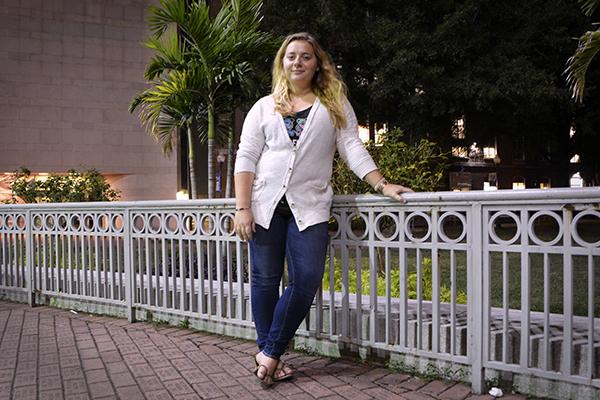When junior Hannah Sofield checked her financial aid profile a week before classes started, she panicked – the money she largely relies on for tuition and housing had never been processed.
“I was in a state of shock,” she said. “I was running through every possibility. Am I going to have GWorld? Am I going to be able to move in?”
Her mother called GW’s Office of Financial Assistance and discovered that Sofield’s financial aid was randomly audited by the Internal Revenue Service. Sofield was one of up to a third of returning students whose financial aid requires additional paperwork, and while the dollars covering her tuition and housing have since come in, her work-study job has been delayed – leaving her without a way to fund her daily expenses.
The biological anthropology major is an administrative assistant at The George Washington Law Review, a publication published by law school students that examines national legal issues, where she earns roughly $1,000 each semester.
And while she waits on her work-study status, she said she spent at least $500 on books for the six classes in which she’s enrolled – money she isn’t sure will be reimbursed.
At home in Philadelphia, Sofield worked as a lifeguard at a country club and a day camp, as well as in a criminal defense attorney’s office, over the summer. She said the money she earned working four jobs over the year was slowly diminishing because of her delayed work-study status.
“I’m lucky in that I’m a saver,” she said. “But I’m going to have to start relying on my parents soon. They don’t just have thousands of dollars to give me.”
Sofield said she and her mother believed that their financial aid forms, which were filed in the spring, had been successfully processed by the University because they were never alerted about a problem.
She received three federal loans her freshmen and sophomore years, and the University awarded her $32,000 in need-based and merit aid each year.
Associate Vice President for Financial Assistance Dan Small said GW is required to participate in the verification process in order to receive and distribute federal aid. He said it takes about two to three weeks after the student completes the process before aid can be distributed.
“We recommend that students work with their work-study site supervisors to adjust their schedules in order to slightly increase their hours worked per week after their start date in order to earn their entire allocation,” Small said.
He added that students can apply for an emergency loan of up to $600 through the Office of Student Financial Assistance if the verification process causes “short-term financial hardship.” That loan could be in their accounts in as soon as two to three business days, he said.
In May, the University increased its undergraduate financial aid pool by about 6.5 percent from the previous year, its largest expansion in six years. In 2014, University President Steven Knapp created a task force, which included financial aid officials, to tackle affordability.
Small also said that GW and the Department of Education will notify students when they are chosen for the audit.
But Michelle Sofield, Hannah Sofield’s mother, said she was never notified that her daughter’s financial aid was audited or that she needed to send more documents to GW’s financial aid office. On Aug. 28, she edited her daughter’s FAFSA form and re-submitted a financial aid verification worksheet, as well as her own tax forms.
“Days would go by with no responses to my emails. I finally began sending ‘Kindly Respond’ emails every couple hours,” Michelle Sofield said in an email.
More than a week later, the office requested an IRS tax return transcript, which can take up to eight weeks for the IRS to process. After that, Michelle Sofield said she sent more emails “begging” for confirmation that GW’s financial aid office had received them.
“To be more helpful, they need to answer emails and help families who are blindsided by the process,” she said.
Carolyn Harris, the office manager for The George Washington Law Review, is writing a book about the publication, which is published six times a year. She said she and Hannah Sofield, who she called “wonderful,” took trips to National Archives and the Congressional Cemetery to conduct research for the book last year.
Harris called Hannah Sofield’s financial aid situation “ridiculous” in an interview.
“I don’t want her stressing. School’s stressful enough. I don’t want her to be stressed about money,” Harris said.
Harris also said that because students who participate in work study are now required to undergo background checks, Hannah Sofield may not be able to start as soon as her work-study aid clears.
“[Harris] said she’s not going to hire anyone else. That got a lot of stress off my chest,” Hannah Sofield said. “But I feel like I’m letting her down.”








